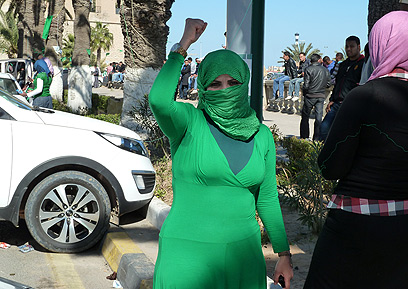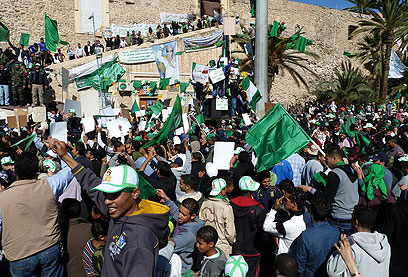
Libya uprising: Journey through land where chaos rules
Ynet, Yedioth Ahronoth reporter risks his life to bring images and voices from bloody streets of Tripoli, including close encounter with Gaddafi at hotel. Deputy FM Kaim: He can't resign because is not a president or secretary general. He is the leader
TRIPOLI - A cloud of yellow dust descended on Tripoli Wednesday. Sandstorms are commonplace here, and this desert city lives within them. Giant posters of Muammar Gaddafi can be seen everywhere. He is worshipped here. On the way to the airport I stop at the Abu Salim neighborhood with a number of other reporters. I take out my camera, and moments later I find myself surrounded by dozens of men, women and children waving pictures of Gaddafi and chanting slogans in his honor.
"Only God, Muammar and Libya" – this is the slogan repeated by Gaddafi's supporters in Tripoli, similar to the famous Nazi slogan "One people, one empire, one guide." This is the essence of the fascist ideology in its Arab version. The crowd closes in on us, but we manage to escape into a minibus that takes us to the terminal.

'I want stability.' Ben-Yishai with Gaddafi supporter
During his 41 years in power, Gaddafi built an entire nation in his own image. For his followers, violence – from pushing and yelling to opening fire – is a way of life. He controls the country with a unique blend of brain-washing, a cult of personality and fascism. His supporters don’t admire his ideology, they admire him.
Well aware of his almost mystic control over the public, in recent days Gaddafi has made it a point to make as many personal appearances as possible. The embattled Libyan leader controls Tripoli and the surrounding cities because he and his security forces are physically present here, as opposed to more distant cities such as Benghazi in the east. His security forces are everywhere – in every street corner.
My journey to Libya began in Malta 10 days ago. I tried to board one of the ferries sent to rescue foreign workers from Libya, but my request was denied. "Gaddafi's men will send us all back if you won’t present official authorization from the embassy," one of the organizers told me. But as I arrived at the Libyan embassy in the capital Valletta, the Libyan ambassador announced that he and the rest of the embassy's staffers support the uprising, waved the flag of the monarchy that was toppled by Gaddafi's military coup in 1969 and walked back into the building.

Gaddafi supporter in Tripoli (Photo: Ron Ben-Yishai)
Colleagues told me that the Libyan embassy in London was still loyal to Gaddafi and that I had a good chance of obtaining a visa there. Shortly after I arrived in London, Gaddafi's son, Saif al-Islam, said any journalist who wishes to assess the situation in Libya first hand was welcome to do so.
"Go to the airport," the Libyan attaché told me (naturally, I did not disclose the fact that I was Israeli), "The Libyan airlines will fly you in without a visa." He was right. On Friday evening, in the midst of another sandstorm, I landed in Tripoli. As I entered without a visa, I was forced to wait a few nerve-wracking hours before an official from the "authority in charge of foreign media" informed me that my entry has been approved. A few hours later a driver came to pick me up from the airport.
The stench outside the terminal was overwhelming, and the site was even more difficult to bear: Thousands of people were sitting in the dark, watching over their belongings, as the sandstorm raged. Migrant workers from Egypt, Ghana, Bangladesh, Turkey and several other countries were waiting helplessly for a plane which may or may not take them back to their homelands.
I was greeted warmly by the receptionist at the Rixos Hotel in central Tripoli, but the following day learned that any attempt to reach sensitive areas would not be tolerated. Police officers, soldiers or plain-clothes security personnel took me back to the center – sometimes with the use of violence.
At night I heard gunfire. The day I landed was a particularly difficult one in Tripoli. Riots erupted after Friday prayers, and in the Tajoura and Suq al Jum'ah neighborhoods Gaddafi's forces dispersed the demonstrations with tear gas and live fire from helicopters – which was used to deter the protestors and did not target them directly. At the same time, security forces took photos of the demonstrators. Now, at nighttime, they are arresting the people who appear in the photos.
People I met in Tripoli told me that some of those who are arrested by Gaddafi's men simply disappear. This happens at nighttime, far from the journalists' eyes. This is also the reason for the sporadic gunfire. The city is filled with roadblocks manned by the soldiers and members of Gaddafi's civilian militias – clutching their Kalashnikovs at all times.

'Gaddafi, nation want civil rights.' Supporters in Tripoli (Photo: Ron Ben-Yishai)
I decide to head out to Tajoura along with another reporter and an interpreter. Surprisingly, we receive authorization. The lines outside the bakeries are long. There is a bread shortage. People are also crowded outside a cooking gas sales center. Ali Ibrahim, 45, drags an empty gas canister while apprehensively looking at a group of men in civilian clothes standing nearby. He refuses to answer my questions. This is how I learned that Gaddafi's men were scattered everywhere. Their weapons are concealed, but they can be recognized by the Afro hairdo and Gaddafi-style sunglasses.
Ibrahim finally agrees to speak with me. "I hope things go back to the way they were," he says. "I want stability. I have a wife and three children."
Muhammad Qalil, a geography teacher who is standing in line behind Ibrahim, cautiously describes the fighting from the previous day. "Security forces fired tear gas at a number of youngsters who threw Molotov cocktails"
I heard you were bombed form the air.
"No," he answers, but the scorched tires scattered on the streets are a testament to what really happened.
Were you on the street yesterday during the protests?
"Yes, because I want change; but I went home as soon as the violence began."
What kind of change are you looking for?
I want the same thing the leader wants. Gaddafi and the nation want civil rights, freedom of speech and other things people in other countries have. We deserve the same things. The leader promised us yesterday we would be granted more rights, as well as housing and jobs for the young people."
Do you believe him?
Qalil smiles and quietly says, "Eighty percent."
On the way back to the hotel we pass by the Bab al-Aziza barracks, where Gaddafi and his family reside. The camp is surrounded by a green wall, and soldiers in full army gear guard the entrance. When I try to take a picture, the driver turns and grabs my hand. "They'll shoot us without hesitating," he says.
Back at the hotel, Gaddafi's representatives tell us the uprising in Zawiyah has ended. We ask to visit this strategic oil town, where battles have been raging for four consecutive days. Those who managed to enter the city reported of dozens of casualties and packed hospitals, but an army checkpoint located 15 kilometers (9.3 miles) outside the city blocks our path and forces us to return to Tripoli.
At 3:30 pm, without prior notice, the hotel employees roll out a red carpet and fervently clean up the courtyard. An hour later we were told that Gaddafi would be arriving at the hotel to grant interviews to French and Turkish television stations.
The Libyan leader arrived shortly before midnight, swathed in a brown robe and turban, accompanied by a female bodyguard, his personal driver and an outer circle of several security officers. The hotel workers cry out "Muammar! You are our father! Our brother! Gaddafi, clenching his fists in the air, smiles and enters the lobby.
Security personnel pushed the reporters away from the leader. Some journalists were beaten.
I was snuck into the room where Gaddafi was giving the interviews. He was sitting down, appearing to be at ease – a small man in a long dress who rules an entire nation with madness.
Samih Hassan, one of Gaddafi's bodyguards, remained outside to watch over the leader's white BMW. "How much do you earn?" I ask him. "Nothing. I volunteer to protect Gaddafi," he replies.
I ask Libyan Deputy Foreign Minister Khaled Kaim if there is a chance Gaddafi will resign. "Are you crazy? He can’t resign because he has no official position," he says. "He is not a president or secretary general. He is the leader."
- Follow Ynetnews on Facebook










